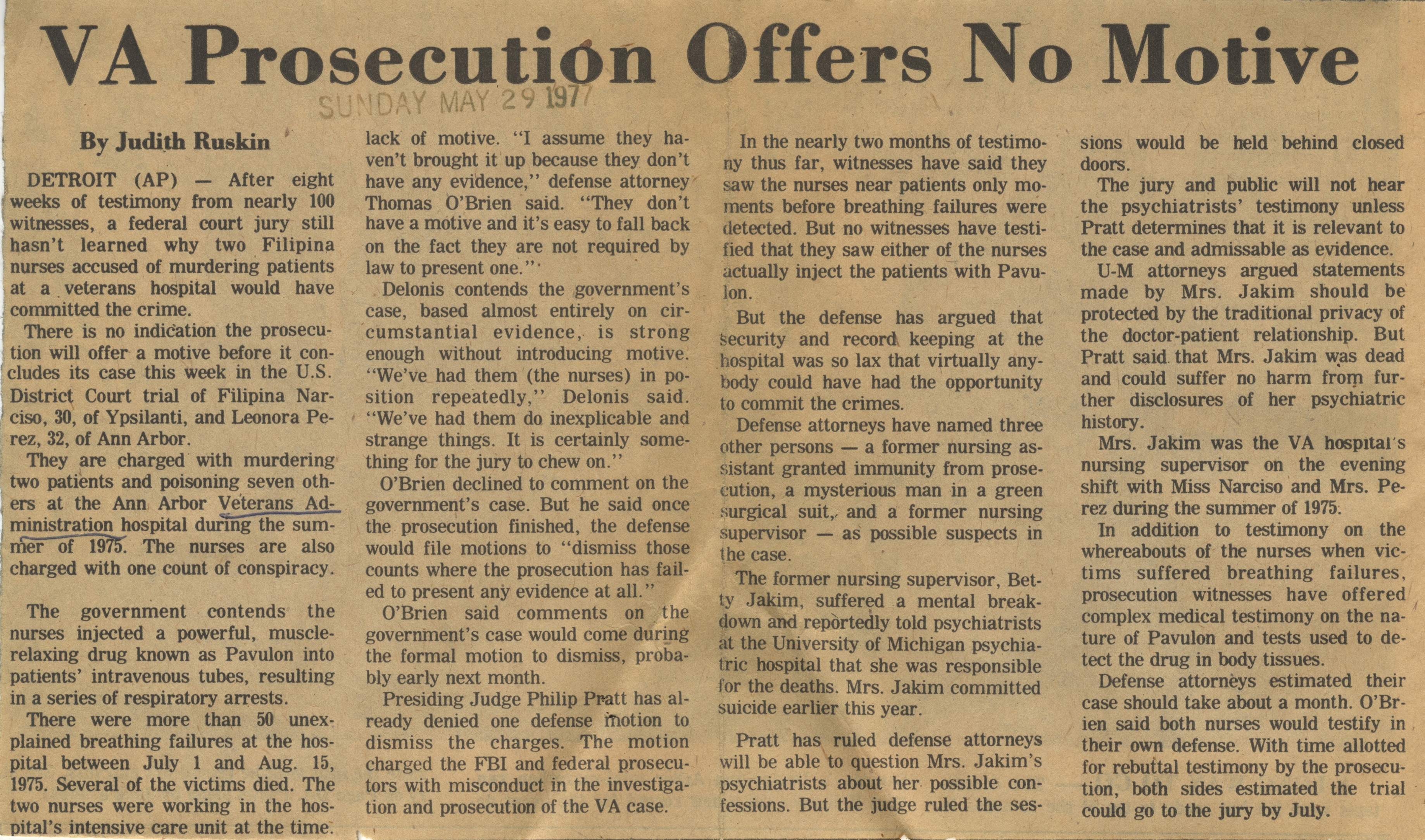VA Prosecution Offers No Motive

VA Prosecution Offers No Motive
By Judith Buskin
DETROIT (AP) -- After eight weeks of testimony from nearly 100 witnesses, a federal court jury still hasn’t learned why two Filipina nurses accused of murdering patients at a veterans hospital would have committed the crime.
There is no indication the prosecution will offer a motive before it concludes its case this week in the U.S. District Court trial of Filipina Narciso, 30, of Ypsilanti, and Leonora Perez, 32, of Ann Arbor.
They are charged with murdering two patients and poisoning seven others at the Ann Arbor Veterans Administration hospital during the summer of 1975. The nurses are also charged with one count of conspiracy.
The government contends the nurses injected a powerful, muscle-relaxing drug known as Pavulon into patients’ intravenous tubes, resulting in a series of respiratory arrests.
There were more than 50 unexplained breathing failures at the hospital between July 1 and Aug. 15, 1975. Several of the victims died. The two nurses were working in the hospital’s intensive care unit at the time.
lack of motive. "I assume they haven’t brought it up because they don’t have any evidence,” defense attorney Thomas O’Brien said. “They don’t have a motive and it’s easy to fall back on the fact they are not required by law to present one.’’
Delonis contends the government's case, based almost entirely on circumstantial evidence, is strong enough without introducing motive. “We’ve had them (the nurses) in position repeatedly," Delonis said. “We’ve had them do inexplicable and strange things. It is certainly something for the jury to chew on.”
O’Brien declined to comment on the government’s case. But he said once the prosecution finished, the defense would file motions to “dismiss those counts where the prosecution has failed to present any evidence at all.” O’Brien said comments on the government’s case would come during the formal motion to dismiss, probably early next month.
Presiding Judge Philip Pratt has already denied one defense motion to dismiss the charges. The motion charged the FBI and federal prosecutors with misconduct in the investigation and prosecution of the VA case.
In the nearly two months of testimony thus far, witnesses have said they saw the nurses near patients only moments before breathing failures were detected. But no witnesses have testified that they saw either of the nurses actually inject the patients with Pavulon.
But the defense has argued that security and record keeping at the hospital was so lax that virtually anybody could have had the opportunity to commit the crimes.
Defense attorneys have named three other persons — a former nursing assistant granted immunity from prosecution, a mysterious man in a green surgical suit, and a former nursing supervisor — as possible suspects in the case.
The former nursing supervisor, Betty Jakim, suffered a mental breakdown and reportedly told psychiatrists at the University of Michigan psychiatric hospital that she was responsible for the deaths. Mrs. Jakim committed suicide earlier this year.
Pratt has ruled defense attorneys will be able to question Mrs. Jakim’s psychiatrists about her possible confessions. But the judge ruled the sessions would be held behind closed doors.
The jury and public will not hear the psychiatrists’ testimony unless Pratt determines that it is relevant to the case and admissible as evidence.
U-M attorneys argued statements made by Mrs. Jakim should be protected by the traditional privacy of the doctor-patient relationship. But Pratt said that Mrs. Jakim was dead and could suffer no harm from further disclosures of her psychiatric history.
Mrs. Jakim was the VA hospital's nursing supervisor on the evening shift with Miss Narciso and Mrs. Perez during the summer of 1975.
In addition to testimony on the whereabouts of the nurses when victims suffered breathing failures, prosecution witnesses have offered complex medical testimony on the nature of Pavulon and tests used to detect the drug in body tissues.
Defense attorneys estimated their case should take about a month. O’Brien said both nurses would testify in their own defense. With time allotted for rebuttal testimony by the prosecution, both sides estimated the trial could go to the jury by July.
Article
Subjects
Judith Rushkin
Crime & Criminals
Criminal Investigations
Federal Bureau of Investigation (FBI)
Federal Indictment
Murder Investigations
Pavulon Muscle Relaxant
Poisonings
Respiratory Arrest Cases
Respiratory Deaths
Veterans Administration Hospital - Murder Trial
Old News
Ann Arbor News
Filipina B. Narciso
Leonora Perez
Richard Delonis
Thomas O'Brien
Philip Pratt
Betty Jakim
2215 Fuller Rd